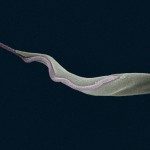Link to Pubmed [PMID] – 11334946
Int. J. Parasitol. 2001 May;31(5-6):588-91
Taking into consideration that the immune response following infection promotes the expansion of lymphocyte clones that are essentially non-specific, ensuring both parasite evasion and persistence inside the host, what would be the major consequences of this polyclonal response to the development of immunopathology? We favor the hypothesis that the polyclonal B cell responses triggered by the infection is responsible of the host susceptibility and is a major contributor to the maintenance of a progressive disease. In particular, the activation of B cells by parasite mitogens would contribute to the class determination of T cell responses and to the inhibition of macrophages – target cells for parasite multiplication and also responsible for parasite clearance. We also envisage that the activation of T cells by parasite ‘superantigens’, and the ensuing energy and deletion of these cells, processes that are frequently observed, would contribute for the immunosuppression as well as to parasite escape and persistence in the host. We had concentrated our efforts on the study of the non-specific aspects of the immune response following Trypanosoma cruzi infection. We aimed at finding new strategies to modulate and control the mechanisms leading to both the immunosuppression and the development of chronic auto-immunity leading to rational vaccine approaches against parasite infection and immunopathology.
